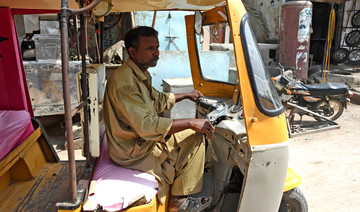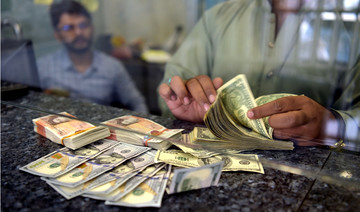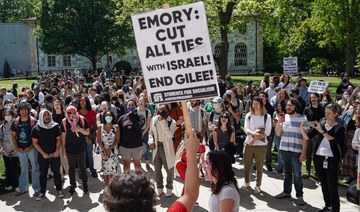PARIS: Pakistan has until February to improve its counter-terror financing operations in line with an internationally agreed action plan, or face action against it, a global watchdog said on Friday.
The Paris-based Financial Action Task Force, which tackles money laundering, said it was concerned that Pakistan had failed to complete the action plan first by a January deadline, then a May deadline and now October.
“The FATF strongly urges Pakistan to swiftly complete its full action plan by February 2020,” it said in a statement.
“Otherwise, should significant and sustainable progress not be made across the full range of its action plan by the next Plenary, the FATF will take action.”
The FATF already has Pakistan on its “grey list” of countries with inadequate controls over curbing money laundering and terrorism financing. But India wants Pakistan blacklisted, which would likely result in sanctions.
“Pakistan needs to do more and it needs to do it faster,” FATF president Xiangmin Liu told reporters in Paris.
Anti-money laundering watchdog gives Pakistan until February to act against terror financing
Anti-money laundering watchdog gives Pakistan until February to act against terror financing
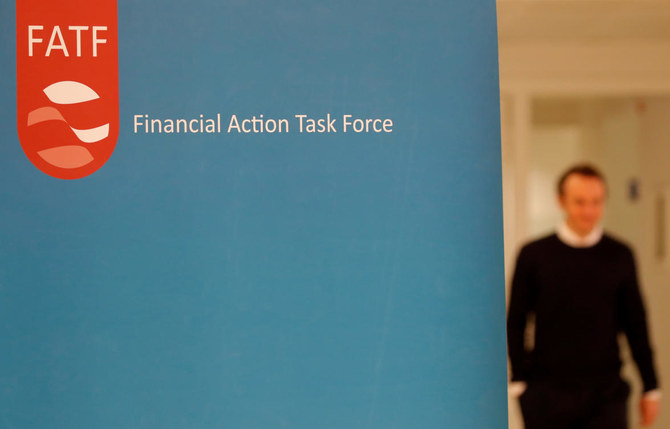
- ‘The FATF strongly urges Pakistan to swiftly complete its full action plan by February 2020’
UN seeks to deescalate Sudan tensions amid reports of possible attack

- UN Secretary-General Antonio Guterres’ envoy is engaging with all parties to deescalate tensions
UNITED NATIONS: The United Nations is increasingly concerned about escalating tensions in Al-Fashir in Sudan’s North Dafur region amid reports that the Rapid Support Forces are encircling the city, signaling a possible imminent attack, the UN’s spokesperson said on Friday.
UN Secretary-General Antonio Guterres’ envoy is engaging with all parties to deescalate tensions in the area, the spokesperson said.
Meituan looks to hire in Saudi Arabia, indicating food delivery expansion

SHANGHAI: Chinese food delivery giant Meituan is seeking to hire staff for at least eight positions based in Riyadh, in a sign it may be looking to Saudi Arabia to further its global expansion ambitions, according to Reuters.
The jobs ads, which is hiring for KeeTa, the brand name Meituan uses for its food delivery operations in Hong Kong, is seeking candidates with expertise in business development, user acquisition, and customer retention, according to posts seen by Reuters on Linkedin and on Middle Eastern jobs site Bayt.com.
Meituan did not immediately respond to a request for comment by Reuters on its plans for Saudi expansion.
Bloomberg reported earlier on Friday that the Beijing-based firm would make its Middle East debut with Riyadh as the first stop.
Since expanding to Hong Kong in May 2023, Meituan’s first foray outside of mainland China, speculation has persisted that its overseas march would continue as the firm searches for growth opportunities, with the Middle East rumored since last year to be one area of possible expansion.
“We are actively evaluating opportunities in other markets,“ Meituan CEO Wang Xing said during a post-earnings call with analysts last month.
“We have the tech know-how and operational know-how, so we are quietly confident we can enter a new market and find an approach that works for consumers there.”
Israeli army says missile fire kills civilian near Lebanon

- The violence has fueled fears of all-out conflict between Iran-backed Hezbollah and Israel
- “Overnight, terrorists fired anti-tank missiles toward the area of Har Dov in northern Israel,” the Israeli army said
JERUSALEM: The Israeli army said Friday a civilian was killed near the country’s northern border with Lebanon, as near-daily exchanges of fire with Hezbollah rage.
Both sides have stepped up attacks this week, with Hezbollah increasing rocket fire and Israel saying it had carried out “offensive action” across southern Lebanon.
The violence has fueled fears of all-out conflict between Iran-backed Hezbollah and Israel, which last went to war in 2006.
“Overnight, terrorists fired anti-tank missiles toward the area of Har Dov in northern Israel,” the Israeli army said, referring to the disputed Shebaa Farms district.
“As a result, an Israeli civilian doing infrastructure work was injured and he was later pronounced dead.”
Israeli media reported that the victim was an Arab-Israeli truck driver. Police told AFP they had not identified the body, but said it was the only one found after a truck was hit.
Hezbollah said it had destroyed two Israeli vehicles in the Kfarshuba hills overnight in a “complex ambush” on a convoy using missiles and artillery.
The Israeli army did not comment directly on the claim.
It said Israeli fighter jets struck Hezbollah targets around Shebaa village in southern Lebanon including a weapons store and a launcher, while soldiers “fired to remove a threat in the area.”
It said fighter jets also “struck Hezbollah operational infrastructure in the area of Kfarshuba and a military compound in the area of Ain El Tineh in southern Lebanon.”
Lebanon’s official National News Agency reported that Shebaa village, Kfarshuba and Helta were targeted by “more than 150 Israeli shells,” leaving homes damaged.
Iran-backed Hezbollah has been trading almost-daily fire with the Israeli army since the day after its Palestinian ally Hamas carried out an unprecedented attack on Israel on October 7.
Since October 8 at least 380 people have been killed in Lebanon, including 252 Hezbollah fighters and dozens of civilians, according to an AFP tally.
Israel says 11 soldiers and nine civilians have been killed on its side of the border.
Tens of thousands of people have been displaced on both sides.
India’s mammoth election heats up in trend-defining second phase
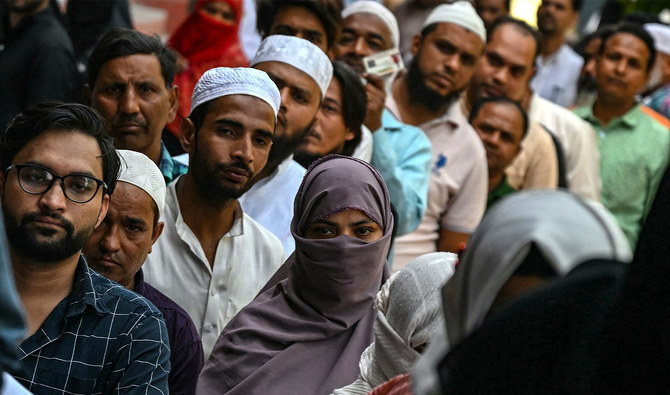
- Turnout in first phase lower than expected at 66 percent compared with 70 percent in 2019
- PM Modi and his BJP are eyeing a rare third straight five-year term in power
NEW DELHI: India’s mammoth general election rolled on Friday into its second phase, which analysts widely believe will likely set the trend for the rest of the polls.
More than 968 million voters are registered to cast the ballot vote in the world’s most populous country, where incumbent Prime Minister Narendra Modi and his Hindu nationalist Bharatiya Janata Party are eyeing a rare third straight five-year term in power.
Modi, who ahead of the election was targeting 400 seats for his BJP-led National Democratic Alliance led by his BJP, is challenged by an alliance of two dozen opposition parties: the Indian National Developmental Inclusive Alliance, or INDIA, led by the Congress Party, which has ruled the country for close to 45 years since independence in 1947.
The first phase of the vote took place on April 19. Polling will go on for six weeks, with results expected on June 4. The other voting dates will be May 7, May 13, May 20, May 25 and June 1.
Analysts say the second phase of India’s polls will define the dynamics of the remaining five phases.
In the first phase, 66 percent of those eligible to vote cast their ballot, compared with 70 percent in 2019.
“From the first phase of the election, the message went that there is a silent undercurrent against the BJP and the dip in the voting percentage sent the signal that the BJP would slip in its strongholds in northern India particularly Uttar Pradesh,” Umakant Lakhera, political commentator in Delhi, told Arab News.
“If the trend of voters’ perceived apathy toward the election in general, and the BJP in particular, continues, then it’s an opportunity for the opposition Congress party to consolidate and mobilize its resources to widen its reach and capitalize on anti BJP sentiment.”
India has a total of 28 states and eight federally governed territories. Some regions complete the voting process in a single day, and others have it spread out in several phases.
Voting last week took place in 21 states and union territories, with nearly 169 million people eligible to cast their ballots. In the second phase, more than 160 million people are expected to vote across 13 states and federal territories.
As many as 1,202 candidates contested the polls on Friday, vying for 88 of the 543 seats in the lower house of Parliament. In the previous phase, 102 seats were up for grabs.
More than half of the 88 seats were in the southern states of Kerala and Karnataka and the northwestern state of Rajasthan.
The party or coalition that wins at least 272 will form the government.
‘MINI GENERAL ELECTION’
The key leader of the opposition coalition and a Congress member is Rahul Gandhi, the son of Rajiv Gandhi, a grandson of Indira Gandhi, and a great-grandson of Jawaharlal Nehru, all of whom have served as prime ministers of India.
But the Congress plunged to a historic low when it was swept out of power by the BJP in the 2014 general vote, and won its second-lowest number of 52 seats in 2019.
Gandhi is seeking re-election from Wayanad in Kerala, the only major state that has never elected a BJP member of parliament, and where Modi’s party was not a main competitor but has been trying to make inroads since last year.
The main contenders, besides Gandhi, are Annie Raja of the Communist Party of India and BJP’s K. Surendran.
“Kerala always has witnessed bipolar politics, but the BJP has been trying this time to make it a triangular contest, and this election will test whether a third force can find space in Kerala or not,” Prof. G. Gopa Kumar, political scientist and adviser to the Kerala-based Center for Public Policy Research, told Arab News.
“The second phase will test whether the stigma of the BJP of being an outsider in Kerala will continue or not, whether the stigma of not winning a seat in Kerala will continue or not.”
Another test for the Congress will be far from Kerala, in the north, where several states were also going to the polls.
“The second phase is a mini-general election. What is at stake is whether the Congress is going to challenge the dominance of the BJP in the north Indian states like Uttar Pradesh, Rajasthan, Madhya Pradesh or not,” Kumar said.
“The contest is getting serious from now on. For the Congress, it is a survival question as they have to prove that they can defeat the BJP and survive as a big force.”
Although surveys suggest Modi will easily win a comfortable majority in parliament, his 400-seat target often repeated ahead of the polls has not been cited since last week’s first phase.
Asad Rizvi, an analyst based in Lucknow, the capital of India’s most populous state and BJP stronghold, Uttar Pradesh, said the party’s performance was not as good as expected despite its tactic to polarize along religious lines.
“A perception has come to dominate after the first phase of elections that the BJP has not performed well in its strongholds in Uttar Pradesh, therefore, the BJP will have a tough time mobilizing its core voters to retain the seats,” he told Arab News.
“The second phase is also crucial that will test whether the BJP’s communal agenda is working or not.”
Blinken says Gaza protests a hallmark of democracy, decries ‘silence’ on Hamas
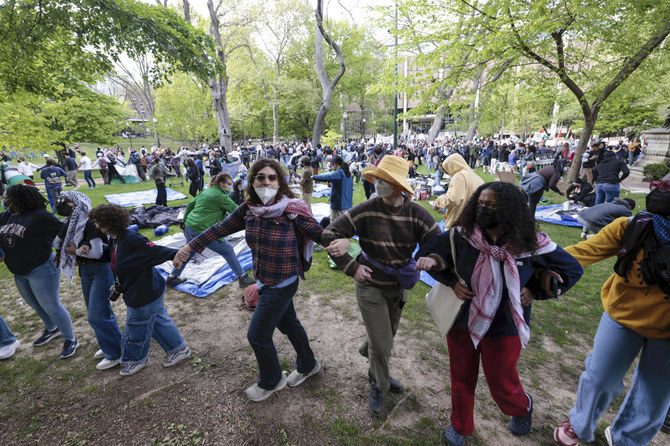
- Police have clashed with students critical of the war and the Biden administration’s support for Israel’s war in Gaza
- Blinken said he understood the conflict elicited “strong, passionate feelings” and that the administration was doing it all it could to halt the war
BEIJING: US Secretary of State Antony Blinken said on Friday protests at US universities over US-ally Israel’s war in Gaza are a hallmark of American democracy, but criticized what he called the “silence” about Palestinian militant group Hamas.
Police have clashed with students critical of the war and the Biden administration’s support for Israel’s war in Gaza, with nearly 550 arrests made over the protests in the last week across major US universities, according to a Reuters tally.
Asked at a press conference in China whether he was taking on board the protesters’ message, Blinken said he understood the conflict elicited “strong, passionate feelings” and that the administration was doing it all it could to halt the war.
“In our own country, it’s a hallmark of our democracy that our citizens make known their views, their concerns, their anger, at any given time, and I think that reflects the strength of the country, the strength of democracy,” Blinken said.
But he suggested critics should focus their ire on Hamas militants who sparked the war with their Oct. 7 attack on southern Israel in which about 1,200 people were killed and some 250 taken hostage, according to Israeli tallies.
Israel’s military response has killed more than 34,000 Palestinians and injured more than 77,000, according to the health ministry in Hamas-ruled Gaza.
“It is also notable that there is silence about Hamas, as if it wasn’t even part of the story,” Blinken said.
“But as I’ve also said repeatedly, the way Israel goes about ensuring that Oct. 7 never happens again matters profoundly. And we’re working every day to try to minimize the damage that’s done to innocent people and to make sure that they have the assistance and support that they need.”
Blinken, who met Chinese President Xi Jinping and other officials in Beijing on Friday, said he had discussed how China can play a constructive role in global crises, including in the Middle East, where he said Beijing can discourage Iran and its proxies not to escalate the conflict.
Blinken said he spoke to Foreign Minister Wang Yi multiple times this month when tensions spiked between Israel and Tehran. China is the main buyer of oil exported by sanctions-hit Iran.
“I think the relationships, again, that China has can be positive in trying to calm tensions, prevent escalation, avoid the spread of the conflict, and we agreed that we’d remain in regular in regular touch on this, and that’s certainly my intention,” Blinken said.



